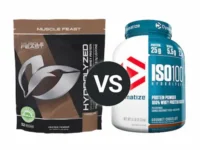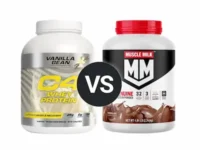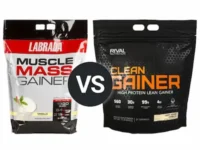Knowledge BaseYou're Questions Answered
BACK
Does protein powder increase muscle size?
Protein powder can be a beneficial supplement for increasing muscle size when used in conjunction with regular strength training and a balanced diet. Protein is a critical macronutrient needed for muscle repair and growth, and supplementing with protein powder can help meet the increased protein demands of active individuals.
How Protein Powder Supports Muscle Growth
- Enhances Muscle Protein Synthesis: Consuming protein powder, especially types with a high biological value like whey, can stimulate muscle protein synthesis, the process by which the body builds new muscle tissue1.
- Reduces Muscle Breakdown: During and after intense exercise, muscle fibers undergo stress and damage. Protein supplements help repair these fibers, which not only aids in recovery but also in building bigger, stronger muscles2.
- Supports Workout Recovery: Protein powder can accelerate recovery by providing essential amino acids needed to rebuild muscle and reduce soreness, enabling more frequent and intense training sessions3.
Optimal Use of Protein Powder for Muscle Growth
- Timing: The timing of protein intake can impact its effectiveness for muscle growth. Consuming protein shortly after a workout—often referred to as the "anabolic window"—can maximize the body’s ability to repair and build new muscle4.
- Quantity: General guidelines suggest consuming approximately 0.7 to 1.0 grams of protein per pound of body weight per day for muscle building, with part of this intake coming from protein powders if dietary protein is insufficient. This translates to about 112 to 160 grams of protein per day for a person weighing 160 pounds5.
- Quality: Choosing a high-quality protein powder is crucial. Look for powders that provide a complete amino acid profile and are easily digestible.
While protein powder alone will not increase muscle size without the stimulus of training, it is a convenient and effective way to ensure adequate protein intake, which is a cornerstone of muscle development. It is always a good idea to discuss your dietary supplements with a healthcare provider, especially if you have underlying health conditions or dietary concerns.
Was this answer helpful? Let us know!
Like
References:
- Phillips, S. M., & Van Loon, L. J. C. (2011). Dietary protein for athletes: From requirements to optimum adaptation. Journal of Sports Sciences, 29(sup1), S29-S38.
- Rasmussen, B. B., & Phillips, S. M. (2003). Contractile and nutritional regulation of human muscle growth. Exercise and Sport Sciences Reviews, 31(3), 127-131.
- Damas, F., Phillips, S., Vechin, F. C., & Ugrinowitsch, C. (2015). A review of resistance training-induced changes in skeletal muscle protein synthesis and their contribution to hypertrophy. Sports Medicine, 45(6), 801-807.
- Aragon, A. A., & Schoenfeld, B. J. (2013). Nutrient timing revisited: is there a post-exercise anabolic window? Journal of the International Society of Sports Nutrition, 10(1), 5.
- Morton, R. W., Murphy, K. T., McKellar, S. R., Schoenfeld, B. J., Henselmans, M., Helms, E., Aragon, A. A., Devries, M. C., Banfield, L., Krieger, J. W., & Phillips, S. M. (2018). A systematic review, meta-analysis and meta-regression of the effect of protein supplementation on resistance training-induced gains in muscle mass and strength in healthy adults. British Journal of Sports Medicine, 52(6), 376-384.
Add to this Answer
Related Questions
Related Reviews

Disclosure
Your Answer
Do you have a suggestion to improve the answer? Please detail your suggestions and provide any references to information that may support your answer if available.
The content on this site has not been written, reviewed or endorsed by a medical professional. We assume no liability for the misuse of supplements and recommend you review the label of any product, as well as consulting with your health care professional.
We are a participant in the Amazon Services LLC Associates Program, an affiliate advertising program designed to provide a means for us to earn fees by linking to Amazon.com and affiliated sites.
We are a participant in the Amazon Services LLC Associates Program, an affiliate advertising program designed to provide a means for us to earn fees by linking to Amazon.com and affiliated sites.
© 2025 ProteinPowder.com



